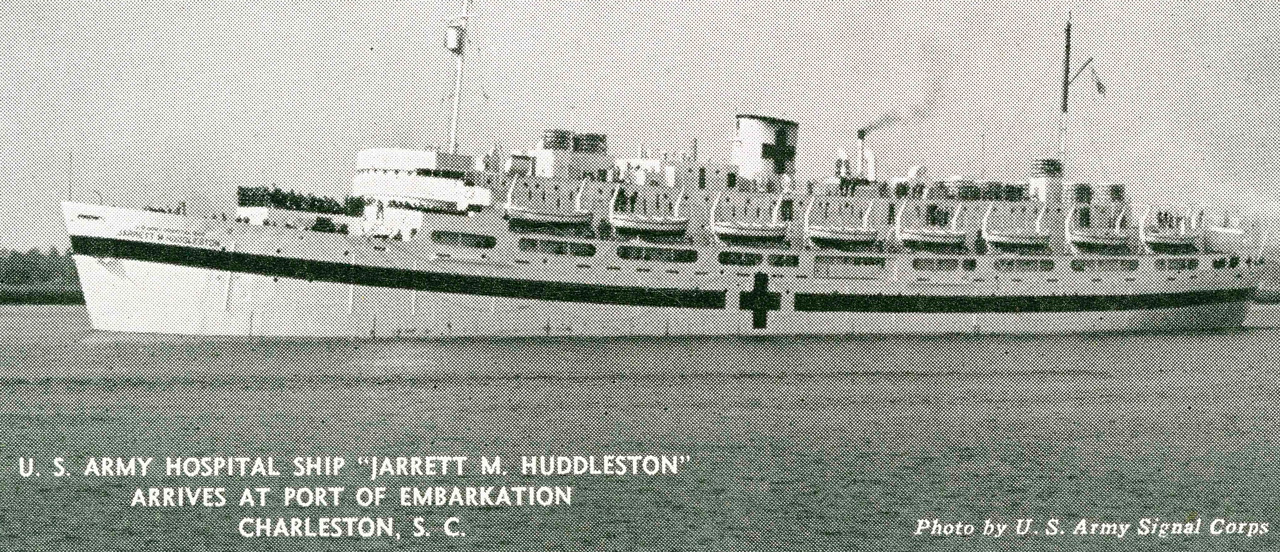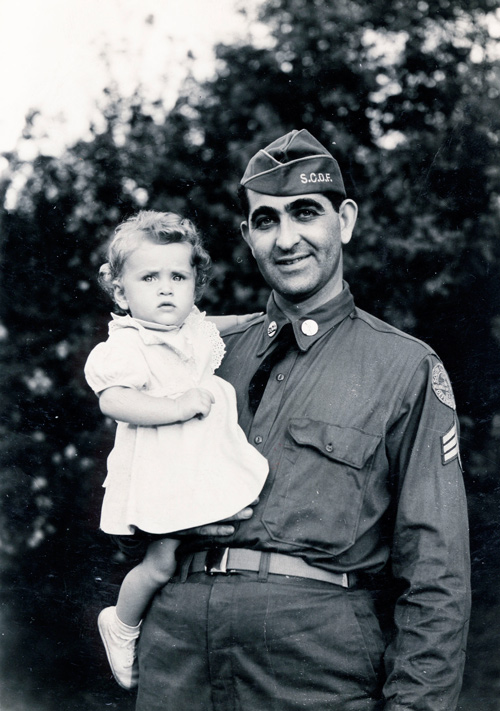

The five sons of David and Rachel Poliakoff of Abbeville, South Carolina, served their country in the World War II era like countless other Americans. All were proud University of South Carolina graduates, and from 1924 through 1940 at least one of the brothers lived in Burney College, Room 48, on the Carolina campus. Their beloved sister, Eva, graduated from Agnes Scott College. Dr. A. Ellis Poliakoff, the eldest sibling, who had established his medical practice in Abbeville before the war, was a captain in the army medical corps, and his three years–plus service included duty on trans-Atlantic hospital ships. Brothers Marion and Myer (my father) served in the SC Defense Force in Walhalla and Abbeville, respectively, where they were dry goods merchants. Arthur (Bud) Poliakoff, who after the war practiced pharmacy in Atlanta, served in the army pharmacy corps, stationed overseas for more than three years. Dr. Samuel R. Poliakoff, the youngest sibling, who later established an Ob-Gyn practice in Atlanta, served in the army medical corps and was dispatched to Korea in late 1945. Ellis and Samuel were graduates of what was then known as the Medical College of South Carolina.
From late August through October 1944, Captain A. Ellis Poliakoff kept a diary, adding a postscript describing his ship’s return to Charleston harbor in December of that year. His entries show the importance he placed on family ties and Jewish observance. He describes the then-routine but now unimaginable complications involved in making a phone call home or catching bus connections from the Port of Charleston to Abbeville and back. It is unknown whether he kept diaries for other periods of his service.
In September 1944, during an outbound voyage on the USA Hospital Ship Huddleston, Captain Poliakoff expressed his hope of somehow connecting with Brother Bud, who was then stationed at Bristol, England. By chance the Huddleston was diverted to Bristol. The diary describes various hurdles he needed to surmount to have a phone call with Bud and arrange for him to visit the ship. Imagine the brothers’ delight when they reunited, and their melancholy when they parted:
Just think, I came over 3000 miles across the ocean and of all the places I could have gone, I land near enough so we can meet. . . . After talking a while, he [Bud] decided he had to get back so we bade each other farewell. I sure hated to part. Wish we could have been going back to the States together. Watched him till the car disappeared from view, then I returned slowly to the ship. A happy reunion had ended. Sure hope it is not long till we can be home and stay there.
Jewish services aboard the Huddleston are a recurring theme:
9 Sept. 1944
We had a large crowd present for services. There were about 32 present. . . . I thought the services very impressive. . . . I brought a Talith for the boy [a T/5, or Technical Fifth Grade, who was a passenger] conducting services. There were Yarmulkes for all that needed them. We have a nice Kiddush cup. There were prayer books for all. What a strange picture this presented. Here we are hundreds of miles from land in the middle of the ocean on a deck near the water line of the ship in a room with a dim light. All seats were taken and I believe all members of the Jewish faith were present except a few. We were praying to the Almighty and I know everyone meant it. . . . We also said the prayer for a safe voyage.
17 Sept. 1944
To-night is the eve before Rosh Hashona. I have made arrangements for services. . . . What a strange place to be holding services but we want to have services. The Lord has been kind to me and I want to say my prayers especially at this time of the year.
 Right: the author’s father, Sgt. Myer Poliakoff, SC Defense Force, with his daughter Doris, now Doris Feinsilber.
Right: the author’s father, Sgt. Myer Poliakoff, SC Defense Force, with his daughter Doris, now Doris Feinsilber.27 Sept. 1944
Fasted all day. We had [Yom Kippur] services this morning at 10 a.m. again at 2:30 p.m., and again at 7:30 p.m. Boat drill interrupted the 2:30 service. . . . Almost every Jewish person on board came to at least one service. . . . I think we did right well considering the circumstances and the fact that we didn’t have a Chaplain.
While the Huddleston was docked at the Port of Charleston preparing for another outbound voyage, Captain Poliakoff reported:
6 Oct. 1944
To-night, Mr. [Nat] Shulman brought four bottles of wine for the Jewish boys for Friday services. He represents the Jewish Welfare Board in Charleston. I had to go to the gate to meet him as he wasn’t allowed inside the Port unless he showed special passes. Lt. Col. O’Connor (Father O’Connor) drove me to gate and back.
Several passages describe Charleston vistas:
1 Oct. 1944 [inbound]
From the bridge deck, I could see familiar landmarks. Somehow from this view Charleston had a foreign appearance. It didn’t look like other American cities. The old homes with their style of architecture makes one think of some strange city not one he has known for so many years. Be that as it may, it was a welcome sight to a native South Carolinian.
7 Oct. 1944 [outbound]
Down the river we sailed watching the Charleston shore line. Under the Cooper river bridge or Grace Memorial Bridge as it is now called. . . . I saw many familiar landmarks that brought back memories of times I spent in Charleston as a [medical] student. The Francis Marion Hotel, Fort Sumter Hotel and Peoples Building. The steeples of many churches were visible especially the familiar ones of St. Michael’s and St. Phillip’s [sic]. Saw the dock of the United Fruit Company that burned the day before. . . . On we sailed out through the submarine nets and into the wide Atlantic.
Numerous entries refer to hospital ship routine, including preparations and inspections, and rough seas that caused all those trying to rest to slide up and down in their bunk beds, and made the plates jump up and down the table in the officers’ mess. There are no patient-specific passages or descriptions of injuries. That omission is consistent with patient confidentiality considerations, and perhaps consistent, too, with a passage written while home in Abbeville during a short leave in December 1944:
One thing, I noticed which stood out to me after being around the sick and wounded, was the fact that no one seemed to be thinking of the war. It also seemed that everyone had somebody in the service somewhere. I suppose many had heavy hearts and were just masking their feelings. It was also at the time the Germans were pushing forward. Probably, it’s best to be this way and not think too much of the war.
After the war Dr. A. Ellis Poliakoff returned to Abbeville and continued his medical practice until his death in 1970, beloved and relied upon by his patients and the entire community.